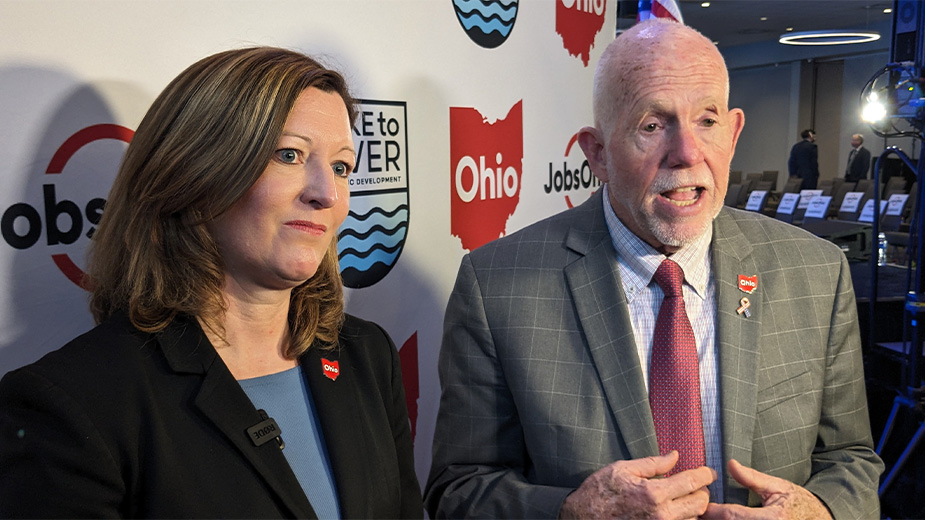Judge Vacates Environmental Permit for Cafaro Co.’s Enterprise Park
YOUNGSTOWN, Ohio –U.S. District Judge Benita Pearson has vacated the issuance of a permit by the Army Corps of Engineers that would allow the Cafaro Co’s Enterprise Park project in Trumbull County to move forward.
The Section 404 permit was issued “in an arbitrary and capricious manner,” the order states, which Pearson issued Thursday. Along with vacating the permit, her order remanded the case for further proceedings consistent with the ruling.
In November 2019, Friends of the Mahoning River filed a complaint opposing the approval, two months earlier, of the permit. The environmental advocacy group argued the permit would allow North Eastwood LLC, a subsidiary of the Niles-based Cafaro Co., to “permanently impact” 15.95 acres of wetlands and 1,608.5 linear feet of streams in Howland Township and the city of Niles.
The property is part of roughly 100 acres of land Cafaro Co. owns in Howland. In 2016, the real estate developer announced plans for Enterprise Park, a proposed $367 million campus that would include medical offices, education buildings and an expansion of Mercy Health’s St. Joseph Warren Hospital. Two years later, Mercy Health announced it was putting on hold plans for that expansion, citing economic uncertainty in the wake of the closing of General Motors’ Lordstown plant.
To offset the environmental impact that the Enterprise Park project would have on local aquatic resources, the Army Corps required North Eastwood to purchase 30.5 wetland credits and 1,620 linear feet of stream credits for $2 million and to preserve roughly 38 acres of wetlands and streams in a specific area adjacent to Mosquito Creek.
“The most glaring issue with the Corps’ analysis is that it has not properly established that it is in the public interest to authorize a project that involves the construction of [a] massive hospital and residential facilities with a declining population in the area,” Pearson wrote. “Many factors, including many large businesses leaving the area, have led the population of this specific area of Trumbull County to decline even more than in surrounding counties.”
Initially, the Corps concluded that the area’s population was increasing and relied on that finding to demonstrate a need for the project, the judge continued. The Corps later conceded that the population was “affirmatively in decline” and had relied on inaccurate statements made by North Eastwood and data from Warren County, which borders Cincinnati, and not the city of Warren.
In a reply brief, the Corps argued that the population information in its public need analysis was not dispositive and that the need for the project existed irrespective of whether the local population was increasing or decreasing. It further contended that North Eastwood’s decision to relocate, the age of the local population and development around the proposed site support the project’s public and private need.
“North Eastwood’s desire to increase revenues is of minimal value in the court’s analysis,” Pearson stated. “Furthermore, whether the population is increasing or decreasing is interrelated with both the age (and the projected age) of the population, and the question of whether the area’s business, educational and medical demand can support even more development,” she said.
“Most importantly, the idea that the Corps would allege that both a population increase and decrease justify a need for the project shows the Corps acted arbitrarily in its analysis,” she continued. “Either the population was truly irrelevant, in which case it should not have used an increase in population to support its initial conclusion, or it continues to push for a predetermined outcome, for which it has worked backward to demonstrate a need.
“In either case, the impact of the population growth is properly addressed during agency proceedings, not in late-stage briefing before a court.”
Additionally, the judge wrote, the Corps’ made a “perfunctory dismissal” of two alternative options: renovating the existing St. Joseph Hospital, known as the “no-build alternative,” and the Old Avalon Golf Course. Its analysis of the sites was not only “independently concerning,” but supported the plaintiff’s argument that the analysis was “result-oriented” and based on North Eastwood’s project purpose, “rather than guided by the statutory factors, particularly in light of the faulty population data.”
In a statement released Friday afternoon, Friends of the Mahoning River applauded Pearson’s ruling, pointing out that her decision noted a role played by the “flawed population and demographic data” in the Corps’ decision and that North Eastwood’s profit motive was “irrelevant” to the Corps’ duty to consider whether the project served the public interest.
Additionally, the decision “expressed concerns that the failure to use accurate data in its decision-making” led the corps to reject “viable alternative sites,” the environmental organization said.
“The Mosquito Creek Wetlands are one of the few remaining pristine urban wetlands in Ohio, and indeed anywhere in the [c]ountry,” said Tom Smith, Friends of the Mahoning River chairman, in the statement. “These wetlands serve many vital functions, from flood control to safeguarding water quality to preserving the biodiversity of our region.
“The court’s decision vindicates what we have been saying for years: because of surrounding socioeconomic factors and because of the critical ecological value of the wetlands that would be destroyed, this is simply an inappropriate site for this type of development, no matter which health-care company might have occupied the site,” he continued.
Joe Bell, director of corporate communications for the Cafaro Co., said company attorneys only received the decision late Thursday and had “only begun” analyzing its contents.
“It would be premature for us to comment at this time,” Bell said.
Pictured: A rendering released by Cafaro Co. of its proposed Enterprise Park development.
Copyright 2024 The Business Journal, Youngstown, Ohio.



